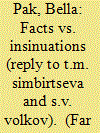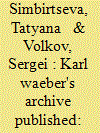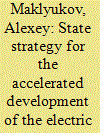|
|
|
Sort Order |
|
|
|
Items / Page
|
|
|
|
|
|
|
| Srl | Item |
| 1 |
ID:
185061


|
|
|
|
|
| Summary/Abstract |
This article offers a brief outline of the history of "Chinese classical textual studies" (Zhongguo gudian wenxianxue), analyzes its content and structure, as well as its place and perspectives in modern China. Chinese classical textual studies emerged as a distinct modern academic discipline based on an ancient domestic tradition and under the influence of Western textual criticism of the 19th century. Since the 1920s, over the last hundred years, it has experienced several ups and downs but steadily continues to maintain continuity with the vast philological knowledge of imperial China while also assimilating appropriate new approaches from Western humanities. The most developed areas of wenxianxue are the editing and publication of ancient texts, theoretical research on the foundations of textual studies, the creation and further exploration of subdisciplines, the analysis of research methods and interdisciplinary perspectives, the study of the history of wenxianxue, as well as various specialized problems. Overall, Chinese classical textual studies
|
|
|
|
|
|
|
|
|
|
|
|
|
|
|
|
| 2 |
ID:
185058


|
|
|
|
|
| Summary/Abstract |
This article analyzes academic research into the life and work of Karl I. Waeber, the first Russian charge d'affaires and consul general in Korea. The positive contribution by scholars to studies of this prominent diplomat's professional biography is demonstrated. Though Waeber's diplomatic work in Korea has been partially reflected in works by B.D. Pak and B.B. Pak on the history of Russian-Korean relations, as well as in a number of articles by other authors, a special monograph by the latter Pak was the first to be devoted to this topic. At the center of her studies was a detailed presentation of Waeber's responsibilities and objectives in Korea, the specific forms they took, and the conditions under which they were carried out; an analysis of Waeber's influence on Russian government policy toward Korea; and an analysis of the international situation in his day that influenced his various decisions.
|
|
|
|
|
|
|
|
|
|
|
|
|
|
|
|
| 3 |
ID:
185057


|
|
|
|
|
| Summary/Abstract |
This article is written on the occasion of the first publication in Germany in summer 2021 of a unique historical source, i.e., the family archive of Karl Ivanovich Waeber (1841-1910), a prominent Russian diplomat and Orientalist. The significance of this event for researchers can hardly be overestimated. The history of the establishment and development of official Russian-Korean relations at the end of the 19th century, as well as a number of important events in the history of Korea in the precolonial period, are inextricably linked with Waeber's name. However, although historians have been writing about his professional activities for decades, very little personal information about him was known until now, and there were no photographs of him at all. With the publication of the book by S. Bräsel, who is privileged to have found this archive, researchers for the first
|
|
|
|
|
|
|
|
|
|
|
|
|
|
|
|
| 4 |
ID:
185059


|
|
|
|
|
| Summary/Abstract |
In 1949, the People's Liberation Army (PLA) drove Chiang Kai-shek's followers from the mainland to the island of Taiwan, but the Chinese Nationalists did not resign themselves to defeat. Enlisting the support of its American allies, the Kuomintang tried to impose a naval blockade on the People's Republic of China and detained foreign cargo ships heading to the Communists. The Nationalists announced the closure of ports taken over by the CPC-led military forces, which gradually turned into an economic and military blockade of the entire Chinese coastline. As a result, foreign and Chinese merchant ships carrying cargo to the PRC were shelled, destroyed, or detained by Nationalist warships. A notorious example was the capture of the Soviet oil tanker Tuapse in 1954.
|
|
|
|
|
|
|
|
|
|
|
|
|
|
|
|
| 5 |
ID:
185056


|
|
|
|
|
| Summary/Abstract |
The year 2009 saw the publication in Russian of the memoirs of former Soviet Foreign Minister and Georgian President Eduard Shevardnadze, which contained an "astonishing" episode of a long argument he had with Deng Xiaoping over border and territorial issues during a February 1989 visit to China. Shevardnadze claimed that Deng expressed the view that vast expanses of the Soviet Union - three to four million square kilometers - belonged to China. These words of Deng in Shevardnadze's memoirs have been cited as an argument in works by many historians of different countries. However, this recollection is not backed by any additional proof. Moreover, many details of this account contradict known historical facts or are entirely illogical. There are grounds for believing that this episode in Shevardnadze's memoirs is an erroneous or even false memory. Neither can the possibility be excluded that it was adeliberate fabrication. This episode can therefore not be considered a reliable source for citation. At the Soviet-Chinese summit, Deng did indeed say that in the past, Russia and the Soviet Union took millions of square kilometers of land from China. At the same time, however, he promised the Soviet leader that China would not make any territorial claims. From the mid-1980s on, Deng Xiaoping actively supported the most rapid settlement possible of Soviet-Chinese border issues through negotiations. This meant that 99% of the border between Russia and China was delimited on a legal basis in the final years of Deng's life. Russian-Chinese border issues have now been settled once and for all. Academic studies and debates on issues associated with territories and borders in the history of Soviet-Chinese relations can of course continue. However, research and discussion must be based on reliable sources and be purely academic in nature.
|
|
|
|
|
|
|
|
|
|
|
|
|
|
|
|
| 6 |
ID:
185054


|
|
|
|
|
| Summary/Abstract |
This article examines historical aspects of the development and implementation of the state strategy for the accelerated development of the electric power industry in the Far East in 1964-1991. Problems concerning power supply in this part of the country are analyzed, programs for the development of the regional electric power industry are considered, difficulties of their implementation are revealed, and structural changes in the industry and results of electrification of the Far East are characterized. The strategy of regional electric power industry development envisaged sharply increasing the production of electricity through the development of new energy resources and large-scale construction, which would thereby solve the electricty shortage, and ensure rapid development of the industry. The strategy in the Far East began to be implemented when the Soviet economy was experiencing a crisis and developing in a conservative and inorganic way. Harsh natural and climatic conditions, the vast
|
|
|
|
|
|
|
|
|
|
|
|
|
|
|
|
| 7 |
ID:
185060


|
|
|
|
|
| Summary/Abstract |
The objective duality of the world and humanity should correspond to the juxtaposition of Oriental and Western studies, but science and pedagogy know only the former, i.e., Orientalism. This monopoly was a consequence of the formation of the modern system of sciences in an era of global domination by the West, which presented the East as its opposite, the non-West, and/or interpreted its relations with it in value-asymmetric categories of culture and barbarism. The publication in 2006 of the Russian translation of E. Said's famous book Orientalism and the scientific and educational reforms of 2010-2013 led to a discussion among Russian Orientalists about the meaning of
|
|
|
|
|
|
|
|
|
|
|
|
|
|
|
|
| 8 |
ID:
185055


|
|
|
|
|
| Summary/Abstract |
The "color revolution" as a low-cost, high-return way to replace a government has become the main means of the US to overthrow unwanted regimes. In recent years, as the US has intensified its efforts to contain Russia and China, it has tried to plan color revolutions near and within our countries. Color revolutions not only undermine the balance of the international system and regional security, but also seriously affect the stability of national power and economic development. In this regard, Russia and China need to work together to prevent color revolutions. In response to changes in their methods - from nonviolent to violent, the emergence of better organizational methods, the lowering of the age of participants - China and Russia should strengthen political, economic, cultural, ideological, educational, and regional cooperation, and strengthen the exchange of
|
|
|
|
|
|
|
|
|
|
|
|
|
|
|
|
|
|
|
|
|